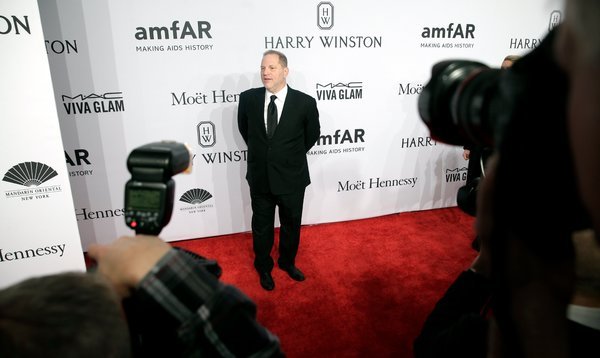Advertisement
Supported by

Feb. 26, 2018
LOS ANGELES — Two weeks ago, the embattled Weinstein Company looked like it had finally found a way forward.
An investor group had emerged with a plan to buy 90 percent of the studio’s assets, including rights to “Project Runway” and a 277-film library. The new company would be primarily led by women.
For the Weinstein Company, crippled in wake of sexual misconduct allegations against its co-owner Harvey Weinstein, the offer was the only way to keep the studio intact and its 150 employees working. Other potential buyers only wanted to cherry-pick properties, and the studio was nearly out of money to keep running.
But the Weinstein Company’s board — or at least the three men remaining on it — said late Sunday that the sale talks, which had been teetering since a lawsuit had been filed this month by the New York State attorney general, had fallen apart. By Monday, finger-pointing over who was to blame had begun. And the studio’s future seemed to be a court-directed sale or liquidation, with assets sold off in bankruptcy proceedings like scrap from a wrecked car.
“There’s nothing pretty about this,” said Larry Hutcher, a corporate lawyer at Davidoff Hutcher Citron in New York who has been following the Weinstein Company’s struggles. “It’s likely going to be a free-for-all that stretches on for months.”
Since October, when the Weinstein Company began to implode after reports in The New York Times and The New Yorker revealed decades of sexual harassment allegations against Mr. Weinstein, very little has gone as expected. At one point, two female-led investor groups were competing to buy the assets, with one intending to give profits to organizations focused on ending harassment, sexual abuse and discrimination.
So there is always the possibility of another twist. The Weinstein Company has yet to file for bankruptcy — it said on Sunday that a filing would happen “over the coming days” — leaving open the possibility, however unlikely, that the two sides could come to an agreement.

Before the deal fell apart, the investor group had offered to pay roughly $275 million for the Weinstein Company, plus the assumption of $225 million in debt. Leading the effort was Maria Contreras-Sweet, who ran the Small Business Administration under President Barack Obama. Backers included Ron Burkle, the billionaire investor, and Lantern Capital, a Texas private equity firm.
“It appears that this transaction has now ended,” Ms. Contreras-Sweet said in a statement on Monday, adding that the Weinstein Company’s move had “surprised” her. “While our efforts did not materialize as we had hoped, I am grateful for my investors who saw the compelling value of a women-led board.”
The Weinstein Company declined to comment. In announcing its bankruptcy plans on Sunday, the company’s board said in a statement, “While we recognize that this is an extremely unfortunate outcome for our employees, our creditors and any victims, the board has no choice.” The studio also made public a sharply worded letter that it sent to Ms. Contreras-Sweet and Mr. Burkle on Sunday that blamed her for failing to “keep your promises” about interim funding.
It was in November when Ms. Contreras-Sweet first sent a letter to the board outlining her proposal. “I will be chairwoman of a majority-female board of directors,” she wrote. “Women will be significant investors in the new company and control its voting stock.” She also proposed creating a fund for victims and establishing a mediation process for reaching settlements.
After failing to find other buyers who would keep the studio intact — Lionsgate, Shamrock Capital Advisors, Killer Content and the Qatari company beIN Media Group were among those considering various pieces — the board entered into exclusive negotiations with Ms. Contreras-Sweet’s group in late January.
Most of the studio’s all-male board had quit in early October. Those who remained were Mr. Weinstein’s younger brother, Bob Weinstein; Tarak Ben Ammar, a Franco-Tunisian financier and film producer; and Lance Maerov, an executive at the advertising giant WPP Group.
By Feb. 10, a Saturday, the two sides were finalizing a deal. The Weinstein brothers, who jointly own about 42 percent of the company, would receive no cash from the sale. Other equity holders would also be wiped out. Bob Weinstein, who had been running the studio since the firing of Harvey Weinstein in October, would step down. According to two people briefed on the talks, who spoke on the condition of anonymity to discuss a private process, the Weinstein Company and Ms. Contreras-Sweet’s group were set to formalize the agreement that coming Monday.
Then came a curveball.
In a phone call on the evening of Feb. 10, two lawyers who work for Eric T. Schneiderman, New York’s attorney general, told Ms. Contreras-Sweet that they had reviewed the proposed deal and wanted to discuss three major concerns, according to the people briefed on the talks. Those were adequate compensation for victims, protections for the studio’s remaining employees and no financial rewards for studio executives who enabled or perpetuated Mr. Weinstein’s misconduct. (Mr. Weinstein has denied ever engaging in “non-consensual sex.”)
Ms. Contreras-Sweet said she believed the proposal addressed those points, but declined to have a substantive conversation.
On Sunday, Feb. 11, Mr. Schneiderman, frustrated by a continued lack of responsiveness from the investor group to his queries, filed a lawsuit against the studio and the Weinstein brothers alleging that they repeatedly violated state and city laws barring gender discrimination, sexual harassment and coercion. And he held a news conference the next morning in which he publicly stated his three requirements for a deal. “As of yesterday, there was no deal that would have met these standards,” he said. In particular, he said, “there was no victim compensation fund.”
By the end of that week, Mr. Schneiderman had started to get what he wanted. The Weinstein Company, for instance, fired its president, David Glasser, on Feb. 16. Mr. Glasser had been expected to run the new studio; Mr. Schneiderman had pointed to him as one of the managers who perpetuated Mr. Weinstein’s behavior. Ms. Contreras-Sweet and Mr. Burkle also met with Mr. Schneiderman and discussed plans to create a full-fledged victim compensation fund, ultimately earmarking up to $90 million.
But the Weinstein Company emailed a letter to the investor group on Sunday saying the deal was dead.
“Over the past two weeks, we had very productive discussions with both parties,” Eric Soufer, Mr. Schneiderman’s director of communications and senior counsel, said in a statement on Monday. “We are disappointed that despite a clear path forward on those issues — including the buyer’s commitment to dedicate up to $90 million to victim compensation and implement gold-plated H.R. policies — the parties were unable to resolve their financial differences.”
Mr. Soufer added, “We will continue to pursue justice for victims in the event of the company’s bankruptcy.”
Bankruptcy would push the pause button on the many lawsuits, some of which predate the harassment revelations, that are pending against the company. “Think of it like musical chairs,” said Jack Tracy, head of legal analysis for Debtwire, a distressed debt research firm. “The music stops and then a judge puts everyone in their chairs one by one.” (Lawsuits can continue against Mr. Weinstein personally unless he makes his own bankruptcy filing.)
The Weinstein Company could pursue a Chapter 7 filing, which involves the appointment of an independent trustee to run a liquidation. Filing for Chapter 11 is perhaps more likely, because it would allow the studio more control over the sale of assets.
“The important thing in the case of this particular company,” Mr. Tracy said, “is that bankruptcy allows assets to be sold free of liability.”
Related Coverage
The All-New DealBook
Please verify you’re not a robot by clicking the box.
Invalid email address. Please re-enter.
You must select a newsletter to subscribe to.
* Required field
* Required field
Thank you for subscribing.
View all New York Times newsletters.
An error has occurred. Please try again later.
You are already subscribed to this email.
View all New York Times newsletters.
Advertisement
Article source: https://www.nytimes.com/2018/02/26/business/media/weinstein-company-bankruptcy.html?partner=rss&emc=rss
Speak Your Mind
You must be logged in to post a comment.